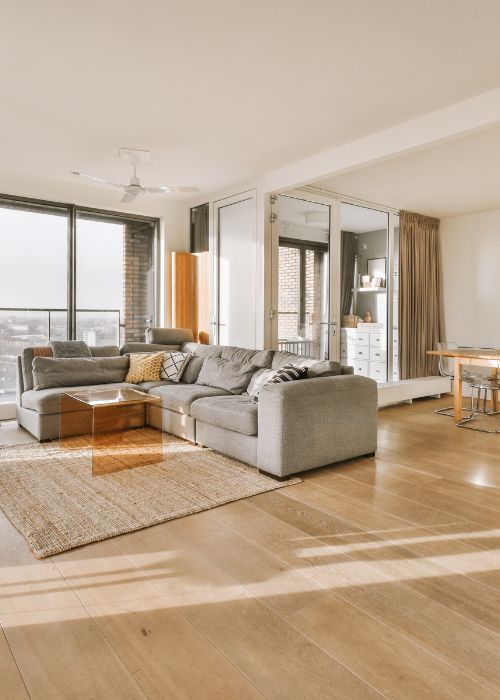Ensure it’s clean, dry, and level.
Reach out for efficient, cost-saving, and luxury wood floor heating.


With decades of hands-on experience, we've honed our craft to become leaders in the heated floor industry. Trust in our expertise to deliver solutions that truly stand the test of time.

For our heated floors, we carefully select and offer only the best products. With GWD you're investing in durability, efficiency, and cutting-edge technology.

We're committed to providing top-tier heated floor solutions at prices that are competitive and fair. No compromises, just the best value for our valued clients.

Our team of highly skilled installers ensures that your heated floor system is set up seamlessly, with precision and care. Experience excellence from the ground up with our expert installation crew.
Delving into the world of radiant underfloor heating, there are two primary contenders: electric and hydronic systems. Both come with their unique set of benefits and challenges, ranging from installation complexities to maintenance needs.

Electric Radiant Underfloor Heating systems utilize electric resistance cables or mats to produce heat.The electric cables or mats are spread out and fixed across the floor, and once activated, they directly heat the floor surface above. Electric systems are inherently more reliable than hydronic systems as they have no mechanical or moving parts that could break down. The installation process is also much quicker and simpler, and there is no required maintenance.

Hydronic systems use a series of tubes laid beneath the floor into which warm water from a boiler circulates, producing radiant heat. They are typically more complex and expensive to install compared to electric systems and have a much higher likelihood of breaking down and need of repair. Hydronic systems also require regular maintenance unlike their electric counterparts.
Wooden floors are a timeless choice that elevates the ambiance of any room. Whether you’re planning a new installation or considering a renovation, it’s essential to be aware of the costs involved, from selecting the wood variety to the subfloors and underlayment.
| Hardwood | $6-22/ft² |
|---|---|
| Or | |
| Engineered Wood | $4-16/ft² |
| Plus | |
| System Cost | $14/ft² |
| Plus | |
| Installation Cost | $8-20/ft² |
| Plus | |
| Subflooring Replacement Costs | $3-10/ft² |
| Plus | |
| Underlayment Costs | $0.50-4.50/ft² |
| Total | |
| Low End Estimate | $29.50/ft² |
| Upper End Estimate | $86.50/ft² |
Same as New Build
Plus
Removal of Old Flooring = $1.50-3.50/ft²
Same as New Build
* Retrofitting entails placing the heating component between the floor joists from underneath the room. This method doesn’t necessitate changing the completed floor; however, it does demand access from an open ceiling below the room. If there’s an existing finished ceiling, like drywall or plaster, it will have to be taken down to access the joists.
Heated wood floors offer a cozy warmth paired with classic elegance. A precise installation is fundamental to fully harness these benefits.
Ensure it’s clean, dry, and level.
Decide on the layout and spacing.
Prevent heat loss and direct warmth upwards.
Follow the planned layout.
Ensure a safe electrical connection.
Adhering to manufacturer’s guidelines.
Re-test the system post-installation.
Yes, it’s possible to install underfloor heating beneath wood floors. Both electric and hydronic radiant heating systems are compatible with both hardwood and engineered wood floors.




EXCELLENTTrustindex verifies that the original source of the review is Google. Sorted our yoga studio heating with some radiant heaters from Green wave. They are an excellent company, who seem to have the client/customer at the centre of what they do!Trustindex verifies that the original source of the review is Google. They helped our designer with the CAD designs for our underfloor heating and spent time with out contracted heating engineer explaining how to install everything. Since the new build the whole heating system seems to be working perfectly and is very energy efficent! Would highly recommend to anyone looking to get underfloor heating.Trustindex verifies that the original source of the review is Google. "I recently had the pleasure of installing GWD's Radiant Heating system under my tile floor in the bathroom, and I must say that it has been an absolute game-changer. Not only has it made the floor warm and cozy to the touch, but it has also made the entire bathroom feel more comfortable during colder months. One of the things I appreciated most about GWD's system was how easy it was to install. The instructions were straightforward, and the whole process took only a few hours. Since the installation, the system has been running smoothly and efficiently without any issues. Overall, I'm extremely pleased with the Radiant Heating system, and I would highly recommend it to anyone looking for a comfortable and efficient heating solution for their floors. "Trustindex verifies that the original source of the review is Google. Our radiant heat mats from green wave distribution have massively brought down the cost to heat our home and have worked perfectly since being installed!Trustindex verifies that the original source of the review is Google. They spent time with our hired heating engineer explaining how to install everything and assisted our designer with the CAD plans for our underfloor heating. The entire heating system seems to be operating flawlessly and efficiently ever since the new construction! I would strongly recommend underfloor heating to anyone.Trustindex verifies that the original source of the review is Google. Managed to get our heated driveway sorted using GWD's. They did a fantastic job expliaining how it all works and working alongside our contruction contractors to get the mats installed. Would 100% recommend!Trustindex verifies that the original source of the review is Google. Really great company! Having a company like Green wave distribution to help us make the right decisions and install the radiant floor heating correctly was a god send. They had everything we needed and did a fantastic job :)Trustindex verifies that the original source of the review is Google. Ordered some snow melt mats from Green wave distribution. They are doing a great job! Big shoutout to Drew who helped with advising the type and explained all the technicalities!Trustindex verifies that the original source of the review is Google. The heat mats were easy to install and the team at Green wave distribution were on hand to help out with any issues or questions we had. If you are looking for underfloor heating, I would highly recommend giving these guys a call!Trustindex verifies that the original source of the review is Google. Green wave helped our designer with the CAD designs for our underfloor heating and spent time with out contracted heating engineer explaining how to install everything. great service,highly recommended.
Yes. Hardwoods, like oak, are well suited to use with radiant floor heating. Hardwood species like oak, cherry and walnut are well-known for their inherent stability.
For wooden floors, electric systems, particularly heating mats, are commonly recommended due to their ease of installation, thin profile, and rapid heating capability. They work well with the thermal properties of wood, ensuring an even spread of warmth.
While it’s technically possible, rooms with higher moisture levels, like bathrooms, can pose challenges. Wood naturally reacts to humidity changes, so combining this with heat can increase the risk of warping. If you’re keen on using wood in such rooms, ensure proper ventilation and consider a moisture-resistant finish.
Yes, excessive temperatures can damage wood floors, causing them to dry out, shrink, or crack. It’s important to adhere to the manufacturer’s recommended temperature limits, usually not exceeding 27°C (80.6°F), and to use a thermostat for monitoring. In such cases, low-voltage systems, such as those offered by Green Wave Distribution, are ideal.
The only other additional cost you are likely to encounter when installing radiant heated floor systems is for floor insulation. This can be required for retrofits, remodels or new build projects but only in certain scenarios, such as rooms that are located above an unheated room or rooms that are on concrete slabs.